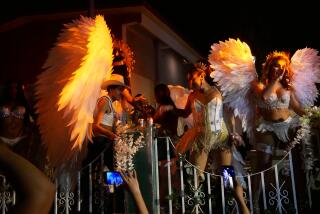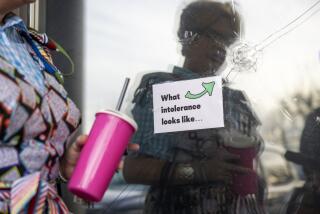In La., thousands to rally for ‘Jena Six’
Beau Jones, Jena High School’s gangly white quarterback, had one question as he parked his white pickup truck outside LaSalle Parish Courthouse: Was all this -- the jostling camera crews and row of satellite trucks -- really for Mychal Bell?
Bell, his former running back, was inside the courthouse, wearing handcuffs and ankle shackles and meeting with the Rev. Al Sharpton. Bell is one of six black teenagers charged with attempted murder for beating a white classmate, raising criticism that justice in this predominantly white Southern town is not colorblind.
“This isn’t Jena,” Jones, 16, said softly as he stared at the metal barricades around the local stores, the surveillance cameras being installed across the street, the gleaming limousine that had whisked civil rights leader Sharpton to this tiny tobacco town. “We’re now on the map as a racist town, but the town I know, everyone pretty much gets along.”
Today, thousands of protesters from across the country are expected to march through Jena (pronounced JEE-nuh), dwarfing its population of about 3,000. Not even the organizers know how many people to expect, but some say it could become a major civil rights march.
“Again, we come to the South to raise new hope, not to condemn,” Sharpton told reporters outside the courthouse. “This is not a march against Jena.”
Yet with predictions ranging from 1,000 to 60,000 protesters, many locals are apprehensive. The march has been publicized on talk radio and Internet blogs.
Jena High School and LaSalle Parish Library will close for the day. Most local business owners planned to close their stores too. Activists, they noted, vowed they would not spend money in Jena.
Logistical preparations for a large protest in a town with only two stoplights is a challenge for law enforcement officials, particularly with so many businesses expected to be closed. A spokesman for the Louisiana State Police said Wednesday that law enforcement from across the region would assist state troopers and police officers. Portable toilets were to be installed downtown, and the American Red Cross was to provide water.
Many residents of this town, which is 86% white, said they resented the media invasion, arguing that the conflict at the high school had been blown out of proportion, fed by journalists and activists’ stereotypes of small Southern towns.
What has become known as the “Jena Six” case began last September, when a black high school student sat under a tree traditionally, although not officially, reserved for whites. The next day, three nooses were hanging from the tree. Three white students were briefly suspended.
Then, in December, a white student was beaten up by six black schoolmates outside the school gymnasium. The black students were charged with attempted murder.
Eventually, those charges were reduced to offenses such as aggravated battery. In June, Bell was found guilty of second-degree battery charges. On Friday, the state 3rd Circuit Court of Appeal threw out his conviction, saying he had been improperly tried as an adult. Bell, now 17, remains in custody while prosecutors decide whether to file new charges against him in juvenile court.
Many locals say Jena is no worse than the cities where protesters are coming from.
Some concede that the black students were dealt with too harshly. Some believe the nooses were just a childish prank; others say the three white students involved were just bad kids, not representative of the overall community.
“We don’t have a sign outside saying blacks are not welcome,” said Pat Randall, 55, owner of Fabrics and More, a block away from the courthouse.
“They talk about nooses and hate, but this is an integrated community,” said Evelyn Talley, 68, who before coming to Jena worked as a teacher for 17 years in Southern California. “At least we mix here. And there are no gangs.”
As Sharpton entered the courthouse to meet Bell on Wednesday, scores of reporters surrounded his media representative, quizzing her about today’s march from LaSalle Parish Courthouse to Jena High School -- specifically which celebrities would be attending.
Rachel Noerdlinger reeled off a list that included Tyler Perry, writer of the film “Diary of a Mad Black Woman”; Bernice King, daughter of the Rev. Martin Luther King Jr.; and hip-hop artist Mos Def.
“Oprah?” asked someone.
“No,” said Noerdlinger. “And Will Smith is not coming.”
Pam Gresham, who works at a bail bonds store opposite the courthouse, tried to ignore the camera crews as she took a cigarette break on her front porch. She said she would not attend today’s protest.
“If all these people would actually see and talk to the people, even go to a football game, they would see it’s not a bad town,” she said. “We all play as one. We all cheer.”
--
More to Read
Start your day right
Sign up for Essential California for news, features and recommendations from the L.A. Times and beyond in your inbox six days a week.
You may occasionally receive promotional content from the Los Angeles Times.







